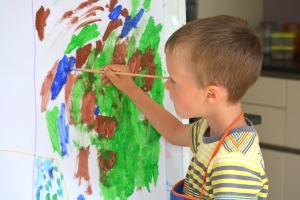Whether they are five or seventy-five, beginning creators don’t know the first thing about their craft, but don’t know they don’t know. They’re playing, experimenting, discovering, having fun, and are thrilled to be creating, and that’s  enough. Then in time, if they are to become more skilled writers, artists, actors, dancers, and so forth, they will realize they don’t know enough about the craft they’ve now become attracted to more seriously.
enough. Then in time, if they are to become more skilled writers, artists, actors, dancers, and so forth, they will realize they don’t know enough about the craft they’ve now become attracted to more seriously.
They want to get better and be more accomplished and have success. So they strive to learn as much as they can about their craft. That drive to get better and better still, to find their one true voice that activates even their deepest creative potentials, to learn, to reach consistent excellence over a long period of time dominates true creators as long as they live.
The more skillfully advanced creators know a tremendous amount about their craft and at times are capable of unique and extraordinary creative feats that make you gasp. Yet, they are incomplete. They realize there are many other things of a non-technical nature to know, having to do with surviving a creator’s sometimes intense, demanding, troubled, uneasy, or tragic existence. Preparation is the key to creative success, whatever the field. Without survival skills the creator is not fully prepared for a creator’s life.
 They acquire survival skills or they do not survive: their career ends prematurely, or they crack up, or their talent abandons them, or the production of work grows increasingly difficult, the ease and effortlessness of the master disappears, leaving in its wake frustration and regret. Horace said that painters and poets alike have always had license to dare anything, but when they lose confidence they become afraid.
They acquire survival skills or they do not survive: their career ends prematurely, or they crack up, or their talent abandons them, or the production of work grows increasingly difficult, the ease and effortlessness of the master disappears, leaving in its wake frustration and regret. Horace said that painters and poets alike have always had license to dare anything, but when they lose confidence they become afraid.
Three Stages
Stage I: At the start of their careers, would-be serious creators work  as though technique and mechanics aren’t especially important. They have a story to tell, a message to communicate, a vision, and that’s all that counts. They start out full of naïve optimism. Unless they are creative geniuses who have powerful creative intuition that more than compensates for technical shortcomings the result is that the work they produce suffers from creative ailments.
as though technique and mechanics aren’t especially important. They have a story to tell, a message to communicate, a vision, and that’s all that counts. They start out full of naïve optimism. Unless they are creative geniuses who have powerful creative intuition that more than compensates for technical shortcomings the result is that the work they produce suffers from creative ailments.
The execution of the work may be dull, awkward, muddled, and show almost no regard for the audience—a failure of craftsmanship. Successes are few. Possibly there are no successes at all. Creators get depressed and doubt their talent: are they good enough or are they fooling themselves that they can produce work that will please them and please an audience? The root difficulty is being blind and deaf to the need for technical abilities. In time that becomes very clear to creators who may come to realize their technique stinks and needs many improvements.
Stage II: Intelligent creators now turn their attention to acquiring techniques so that their work becomes more  coherent, less obscure, and less naïve. Technical abilities take over from inspiration. Creators become preoccupied with acquiring technical knowledge about their craft and the mechanics of producing quality work. They study to ferret out the secrets of the best in the field, read articles, books, and blogs. They take classes, educate themselves (the principal source of a creator’s expertise), find a mentor, locate good teachers, get involved in a writer’s, artist’s, or actor’s milieu, and may go to workshops, conferences, and retreats. They work hard. Their technical skills do improve. They are better creator this year than they were last year.
coherent, less obscure, and less naïve. Technical abilities take over from inspiration. Creators become preoccupied with acquiring technical knowledge about their craft and the mechanics of producing quality work. They study to ferret out the secrets of the best in the field, read articles, books, and blogs. They take classes, educate themselves (the principal source of a creator’s expertise), find a mentor, locate good teachers, get involved in a writer’s, artist’s, or actor’s milieu, and may go to workshops, conferences, and retreats. They work hard. Their technical skills do improve. They are better creator this year than they were last year.
Stage III: Then creators realize that technique and mechanics are insufficient–that there are many creator’s survival  needs they didn’t anticipate, and are unprepared for, and a whole set of little-discussed survival skills directly related to success and fulfillment that technique can’t help them with. Serious creators’ lives are full of pressures, strains, dilemmas, quandaries, and problems. Bonnie Feldman was of the same mind when she said in Writing Past Dark: “The bookstores shelves sagged with volumes on technique. A hundred authors explained how to show don’t tell, and why a story needs a conflict. Why hadn’t anyone written a book that would help me?”
needs they didn’t anticipate, and are unprepared for, and a whole set of little-discussed survival skills directly related to success and fulfillment that technique can’t help them with. Serious creators’ lives are full of pressures, strains, dilemmas, quandaries, and problems. Bonnie Feldman was of the same mind when she said in Writing Past Dark: “The bookstores shelves sagged with volumes on technique. A hundred authors explained how to show don’t tell, and why a story needs a conflict. Why hadn’t anyone written a book that would help me?”
What Technique Can’t Help You With
Creator-survivors must be natural, less controlled, less inhibited, less blocked with punishing self-criticism, more expressive and spontaneous. They must be balanced, flexibly-minded, less strained, less anxious–carefree, focused on their work, not themselves –manifestations of good mental health. How otherwise will they ever be able to “snare the spirits of mankind in nets of magic?” Technique will not teach creators those things, yet they are crucial to the writer’s, artist’s, actor’s, and performers’s well-being and productivity.
 Technique will not teach you the single greatest survival quality of any successful creative enterprise: a desire to excel that dominates the creator, a need so strong that not much else matters as much. That is an empowering survival skill major creators possess without exception. Do you possess it?
Technique will not teach you the single greatest survival quality of any successful creative enterprise: a desire to excel that dominates the creator, a need so strong that not much else matters as much. That is an empowering survival skill major creators possess without exception. Do you possess it?
Technique won’t help you overcome the miseries of self-doubt and discouragement—the creator’s main inner obstacles to success–that dreariness that has ruined tens of thousands of creator’s careers. Technique is terribly important, but it will not teach you the survival quality of simple, unadulterated courage in the face of hurtful setbacks, cruel criticism, and heart-breaking adversity.
Nor will it teach you the necessity of creator’s taking calculated risks, normally the only path to success. It will not teach you the survivor’s drive, high focus, and persistence which may be a more important success factors than brilliant intelligence. These are qualities creators must possess to survive.
Technique will not teach you the daily-needed psychological skills of optimism, powerful motivation, and stamina. Technique will not teach you a single one of psychological and spiritual survival skills that you need to supplement the creative techniques you’ve acquired.
Preparing For Survival
Creators should learn to dialogue among themselves freely, unabashedly, happily in their everyday creative lives about such needed Stage III creator’s inner survival qualities as strength, persistence, will power, commitment, empowerment, sense of purpose, discipline, good creative moods. And ideal creative moods, resilience, enthusiasm, guts, energy and sweat, passion, sacrificing for the sake of your craft, and boldness, doggedness, adaptability, endurance, patience, maintaining at all times a confidence of succeeding, and other dimensions of you, the creator. These inputs will make you a better-prepared.
If you lack those internal skills of the heart and mind you must acquire them just as you acquired creative technique. You can do that. You can acquire survival skills of mindfulness, meditation, and non-attachment. You can learn to endure rejection and manage stress. You can learn to listen to your body and enjoy your work more. You can become more optimistic and resilient. You can learn tranquility and peace of mind from reading people like the master Vivekananda. You can read biographies of great creators to see how they overcame adversity. You may wish to read my Fighting To Win which has specific strategies to help you on your path.
 Be aware of where you are deficient and what your survival needs are, as “I am not a confident person now; I must work on that.” Then you can set out on a program of self-development designed to better equip you for your chosen creator’s role, your creator’s life path that you may wish to follow till the last breath of your life.
Be aware of where you are deficient and what your survival needs are, as “I am not a confident person now; I must work on that.” Then you can set out on a program of self-development designed to better equip you for your chosen creator’s role, your creator’s life path that you may wish to follow till the last breath of your life.
Begin the day by asking, “Am I strong today?” “Will I persist?” “Will I be confident?” “Will I stop doubting my talent?” “Will I adapt and be patient?” “Will I be enthusiastic today?” “Will I be courageous?”
© 2018 David J. Rogers
For my interview from the international teleconference with Ben Dean about Fighting to Win, click on the following link:
Interview with David J. Rogers
Order Fighting to Win: Samurai Techniques for Your Work and Life eBook by David J. Rogers

Click on book image to order from Amazon.com
or
http://www.barnesandnoble.com/w/fighting-to-win-samurai-techniques-for-your-work-and-life-david-rogers/1119303640?ean=2940149174379
Order Waging Business Warfare: Lessons From the Military Masters in Achieving Competitive Superiority

Click on book image to order from Amazon.com
or
http://www.barnesandnoble.com/w/waging-business-warfare-lessons-from-the-military-masters-in-achieving-competetive-superiority-revised-edition-david-rogers/1119079991?ean=2940149284030
 How does the creative process work?
How does the creative process work? As we go about our daily lives, just like pieces of a jigsaw puzzle being revealed, the seed sprouts ideas that give us more information…..This can happen at any time.
As we go about our daily lives, just like pieces of a jigsaw puzzle being revealed, the seed sprouts ideas that give us more information…..This can happen at any time.








